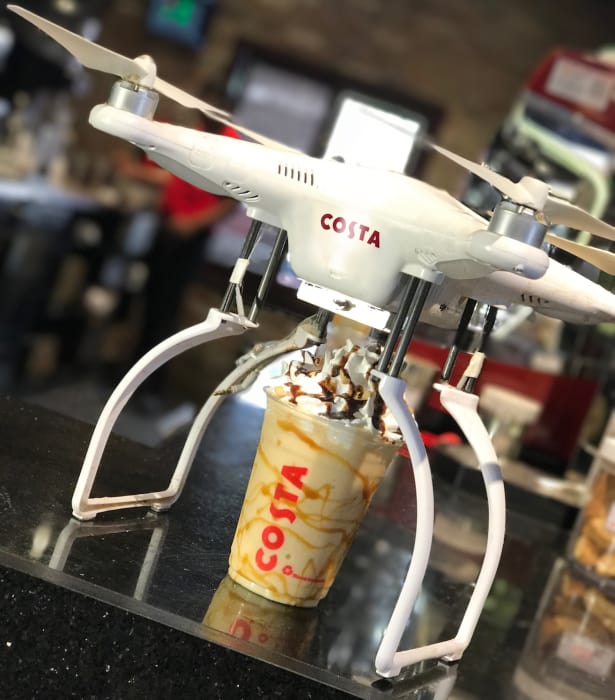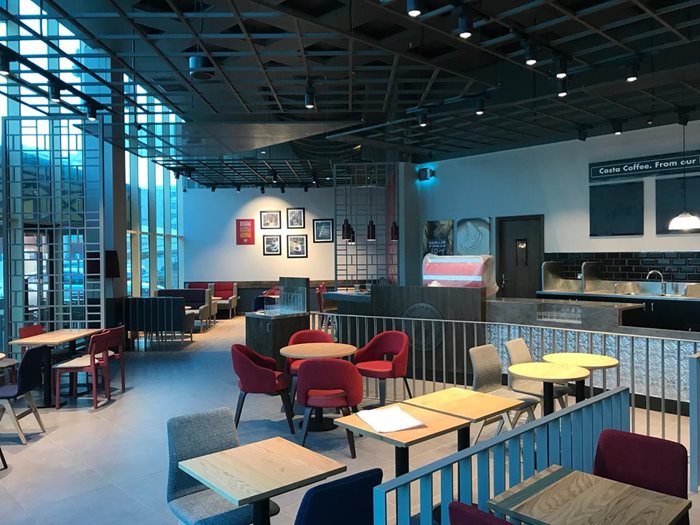Since entering the Middle East coffee shop market in 1999, Costa Coffee has grown to more than 400 stores across 9 countries. We spoke to Louise Bray, Costa’s Regional Marketing Manager MENAI, and Tom Edgar Head of Franchise, MENAI, about three key market trends across their Middle East portfolio
.jpg.aspx?lang=en-GB&width=700&height=642)
Costa Coffee, Dubai International Airport
1. Convenience and customer engagement in the UAE
The UAE was Costa’s first foray into the Middle East and today it’s the UK-based coffee chain’s largest market in the region, with more than 150 stores. Since 1999, Dubai has developed into a regional hub for coffee culture innovation, with consumers developing a taste for international brands alongside a growing number of independent specialty cafés. With its fast-paced lifestyle and vibrant multi-cultural society, making coffee available whenever and wherever in Dubai is crucial. This is supported by Allegra research, which shows more than three quarters of UAE industry leaders surveyed cite location as the most important factor behind coffee shop success – ahead of coffee quality and service.

Costa Coffee trialled a Dubai drone delivery service in 2017
“It’s a very convenience-driven market – you can get almost anything delivered at any time of day and that is only going to grow,” says Louise Bray, Costa Coffee’s Regional Marketing Manager for MENAI. Costa operates two drive-through sites in Dubai and offers home delivery available across the city. In 2017 the chain made headlines for trialling drone delivery from its Jumeirah Beach Road store after 82% customers they’d be happy to use the ‘Coffee-copter’ service. We may be some way off regular Costa drone drops, but the initiative emphasises the willingness of Dubai’s consumers to engage with innovative convenience concepts.
In the 19 years since Costa Coffee first arrived in the UAE, competition in the coffee shop sector has increased, with both international entrants and a new crop of domestic chains seeking to capitalise on the city’s hub status for the region’s coffee innovation. “There’s a growing supply of F&B outlets, particularly in Dubai. While many are small enterprises, each is vying for a consumer’s coffee occasion,” explains Tom Edgar, Costa Coffee's Head of Franchise, MENAI.
Indeed, more than half of industry leaders surveyed by Allegra in the UAE cited increasing competition as the number one challenge facing the country’s coffee shop market. But Costa is rising to the challenge by fostering customer loyalty in the UAE and the wider Middle East market. Initiatives such as in-store activities and tastings, ongoing new product launches external events and in-store loyalty cards all generate engagement. The coffee shop chain even offers in-store Arabic lessons for the Dubai’s large expat community.
2. Growth in Saudi Arabia and Kuwait
With a population of 34 million people and a positive economic outlook for the next 12 months, Saudi Arabia’s coffee shop market shows vast potential as consumer demand for premium coffee grows. Costa Coffee currently operates 60 stores in the country with franchise partner, Jawad Business Group, and is seeking to grow its presence to meet the anticipated uptake in consumer demand.
With economic reforms ongoing, Saudi Arabia is poised for big coffee shop market growth in the next five years. Indeed, the liberalisation of the economy under the government’s ‘2030 Vision’ is expected by many industry leaders to significantly boost Saudi Arabia’s F&B sector. More than three-quarters of Saudi industry leaders surveyed by Allegra believe like-for-like for sales in the coffee shop sector will outperform national GDP in the next 12 months.

Costa's store at the Gulf Hotel, Kuwait
Frequently cited by industry leaders as the region’s market to watch, Kuwait is another Middle East market brimming with potential. Costa opened its 51
st store in the country in 2018 and is seeking to double in size with franchise partner, Alghanim Industries. Kuwait City is already home to a vibrant coffee shop scene, with the vast majority of industry leaders surveyed by Allegra forecasting positive trading conditions in the country over the next 12 months
3. Localisation and increased demand for premium coffee
When it comes to marketing new products in the Middle East, consumers are adopting a more diverse and complex array of coffees than ever before. Since Costa Coffee first arrived in the Middle East, the popularity of artisan F&B concepts has surged, further catalysing the trend toward premium coffee in the region. Moreover, growth in specialty coffee is cited as a key trend across the Middle East among industry leaders surveyed by Allegra.
In response to this trend, Costa has introduced a rotating menu of character roasts to its Middle East portfolio, giving customers additional choice to their signature Mocha Italia. Cold brew and nitro, which the coffee shop chain introduced in 2017, also feed into these trends. While the latter products are naturally attuned to the region’s hot weather, they also tap into consumer’s growing appetite for a wider array of coffee-based products, especially those that pack visual punch – something which is vital in the Middle East market, according to Bray. “Experience and theatre around coffee in the Middle East is important. Products need to offer something new, something to take a picture of and share with your friends,” she says.
Customers in the region also tend to have longer dwell times compared to Costa’s other global markets. That’s why many Costa stores in the region provide a higher volume of more comfortable seating in-store than in the UK. Food menus are also adapted to suit local tastes, providing western concepts with a local flavour such as cheese and olive simit bread, halloumi and falafel wraps.
Costa’s strategy is indicative that a ‘copy and paste’ approach from the UK isn’t right for their Middle East operation. Instead, the business has balanced locally-tailored experiences with the consistency of being an aspirational western brand. In this regard, the international chain has been hugely successful.
Allegra research shows competition in the Middle East’s coffee shop sector is heating up, but growing demand for more sophisticated beverages and store concepts continues to present a lucrative opportunity. Like Costa Coffee, those brands that can innovate and expand their proposition in this dynamic coffee shop market look set for continued growth over the next five years.
.png.aspx?lang=en-GB)